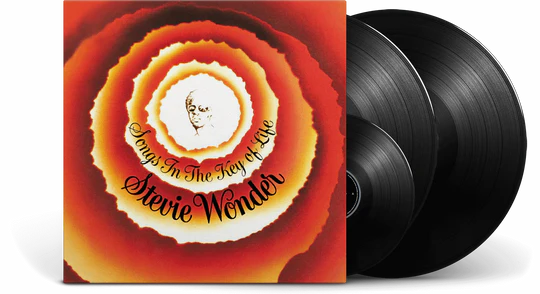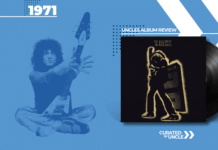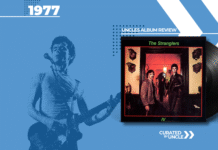The Audacity of Genius
There are albums that change music. And then there’s Songs in the Key of Life, which didn’t just change music – it showed up, rewrote the syllabus, fired the teachers and then played every instrument better than anyone else could. Released in 1976, this sprawling double LP with a bonus EP is basically Stevie Wonder thundering from the mountaintop: “Here’s everything I’ve ever felt, thought, or hallucinated, in stereo.”
At this point, Wonder was in his mid-20s and had already released a string of genre-defining albums (Talking Book, Innervisions, Fulfillingness’ First Finale)—any of which would have been the crowning achievement in a normal career. But Stevie, being Stevie, thought, “Nah, let’s release a 21-track conceptually dense, musically encyclopaedic album and make everyone else look like they’re playing kazoo in a school assembly.”
And he did.
Table of Contents

Track-by-Track (Not Quite, We’d Be Here Until the Heat Death of the Universe)
Let’s not insult your intelligence or your scroll wheel by dissecting all 21 tracks, but we’ll touch the standouts – because, frankly, every track is a standout. It’s like picking favourite limbs.
Love’s in Need of Love Today
It begins soft, like a hymn for a planet on the verge of nervous collapse. Wonder’s voice is so pure it could make fascists weep. A plea for love in a world that keeps defaulting to cruelty – sadly still relevant, because humanity hasn’t evolved past throwing shoes at each other on Twitter.
Sir Duke
The musical equivalent of popping champagne and breakdancing in a tux. This tribute to Duke Ellington is basically Wonder saying, “Here’s how you write a hook so catchy, you’ll still be humming it while arguing with your partner about IKEA furniture.”
I Wish
A full-force funk missile, powered by childhood nostalgia and basslines so bouncy they violate Newtonian physics. Proof that reminiscing about being grounded as a kid can still slap harder than most adult conversations.
Pastime Paradise
Yes, the one Coolio nicked. A haunting choral-backed sermon about social injustice, consumerism and faux enlightenment. It’s as if Wonder peeked 40 years into the future and predicted Instagram spirituality and crypto bros.
Isn’t She Lovely
A harmonica-drenched ode to his newborn daughter. It’s heartfelt, adorable and just a bit smug in that “look how perfect my baby is” way – but you’ll forgive him, because it’s Stevie Wonder and not your cousin who keeps posting nappy updates on Facebook.
The Musical Equivalent of a Flex
Stevie Wonder didn’t just write this record – he arranged, performed and produced most of it. He played a terrifying array of instruments (synths, drums, piano, harmonica, clavinet, you name it) while assembling a dream team of session musicians and vocalists who were probably just grateful to be allowed in the same room as him.
It’s genre-defying, folding soul, jazz, funk, pop, gospel, Afrobeat and orchestral into one cohesive narrative. Somehow, Songs in the Key of Life manages to be both sprawling and tightly woven, like a funk-powered Tarantino movie set in a church and scored by Bach.
Even the bonus EP, A Something’s Extra, is full of material that other artists would kill to pass off as an A-side. Wonder gave us gold, platinum AND the mine it came from.
Lyrical Depth: Philosophy for the Dancefloor
If you think Stevie Wonder only writes love songs and sunshine funk, Songs in the Key of Life will slap you back into your seat with verses about spiritual decay, racial inequality, poverty, parenthood, mortality, environmentalism and how rubbish politicians are. And somehow, it’s never preachy – just piercingly wise and weirdly danceable.
Take Village Ghetto Land: a satirical waltz played on a Moog, where strings sway gently behind lyrics about starvation and apathy. It’s like someone pairing foie gras with a punch in the face.
Or Black Man, a roll call of unsung heroes across racial lines delivered over a manic drumbeat like a quiz show hosted by Malcolm X and Mr. Rogers. Even today, most artists wouldn’t have the nerve to make this track. Wonder didn’t just make it – he made it slap.
Cultural Impact: The Album That Broke the Scale
Let’s get this straight: Songs in the Key of Life debuted at No. 1 on the Billboard 200 – something no double album had ever done. It was nominated for seven Grammys and won Album of the Year. Elton John reportedly said he’d retire if Stevie didn’t win. (Spoiler: he didn’t have to.)
Prince was obsessed with it. So were Kanye West, Mariah Carey and basically any artist with ears and aspirations. When Barack Obama met Stevie, he fanboyed harder than most of us would if handed the Infinity Gauntlet.
This is the album you’ll find in the Library of Congress, every critic’s “Top 10 of All Time” and at least three overly earnest vinyl collector Instagrams near you. It’s not an album. It’s a manifesto for how music should be made: with soul, scope and a complete disregard for limitations.
Five Stevie Trivia Nuggets to Ruin Pub Quizzes With
- It Almost Never Happened
In 1975, Stevie nearly quit music entirely and moved to Ghana to do humanitarian work. Instead, he signed a $37 million record deal with Motown (the biggest ever at the time) and made Songs in the Key of Life. Ghana’s loss, music’s gain. - It Took Over Two Years to Finish
The album was so delayed that music journalists were sending “missing album” jokes via telegram. Stevie’s response? Create a masterpiece so undeniable it silenced every critic and earned standing ovations on delivery. - He Played a TON of Instruments
Wonder handled keyboards, drums, harmonica and vocals across most of the album. It’s less a band and more a solo artist with supernatural powers. - It Includes a Baby Crying On Purpose
That adorable wailing in Isn’t She Lovely is actually Wonder’s daughter Aisha, recorded mid-bath. It’s probably the only time in history a baby scream enhanced a track rather than ruined it. - He Invented a Synth String Orchestra
With help from TONTO (a mammoth analog synthesiser), Wonder recreated string sections before sampling existed. Basically, he predicted the future and made it funky.
My Final Thoughts: A Love Letter Dressed as a Sarcastic Eulogy
Songs in the Key of Life is what happens when someone with a God-tier talent and zero chill decides to capture all of human experience in album form. Love, politics, religion, grief, funk, social justice, harmonicas – it’s all here. You don’t listen to it; you absorb it like a cultural radiation leak, only with better basslines.
It’s a monument. A kaleidoscope of sound that makes you want to cry, dance, question your life choices and maybe call your mum.
And even nearly 50 years later, no one’s really topped it. Not because they haven’t tried – God knows they’ve tried – but because it’s hard to outdo an album that already sounds like it was co-written by angels and Motown execs on mushrooms.
Stevie Wonder wasn’t just in his prime. He was the prime.

If You Like Songs In The Key Of Life, I Recommend These Albums:
- What’s Going On – Marvin Gaye (1971)
Another Motown masterpiece that marries politics and soul so seamlessly, it makes modern protest songs look like badly written tweets. Gaye and Wonder were label mates and mutual inspirators – if Wonder is the preacher, Gaye is the prophet. - Innervisions – Stevie Wonder (1973)
Consider it a prequel to Songs in the Key of Life, with sharper political commentary and less sprawl. The track Living for the City alone is a mic drop on systemic racism. - The Miseducation of Lauryn Hill – Lauryn Hill (1998)
A spiritual successor in both ambition and content. It’s genre-bending, unapologetically emotional and infused with that same lyrical sharpness dressed up as a love song. Wonder would approve.

Songs In The Key Of Life
| # | Track | Duration |
|---|---|---|
| 1 |
Love's In Need Of Love Today
Stevie Wonder
|
07:05 |
| 2 |
Have A Talk With God
Stevie Wonder
|
02:42 |
| 3 |
Village Ghetto Land
Stevie Wonder
|
03:25 |
| 4 |
Contusion
Stevie Wonder
|
03:45 |
| 5 |
Sir Duke
Stevie Wonder
|
03:52 |
| 6 |
I Wish
Stevie Wonder
|
04:12 |
| 7 |
Knocks Me Off My Feet
Stevie Wonder
|
03:36 |
| 8 |
Pastime Paradise
Stevie Wonder
|
03:27 |
| 9 |
Summer Soft
Stevie Wonder
|
04:14 |
| 10 |
Ordinary Pain
Stevie Wonder
|
06:23 |
| 11 |
Isn't She Lovely
Stevie Wonder
|
06:34 |
| 12 |
Joy Inside My Tears
Stevie Wonder
|
06:29 |
| 13 |
Black Man
Stevie Wonder
|
08:29 |
| 14 |
Ngiculela-Es Una Historia-I Am Singing
Stevie Wonder
|
03:48 |
| 15 |
If It's Magic
Stevie Wonder
|
03:12 |
| 16 |
As
Stevie Wonder
|
07:08 |
| 17 |
Another Star
Stevie Wonder
|
08:28 |
| 18 |
Saturn
Stevie Wonder
|
04:53 |
| 19 |
Ebony Eyes
Stevie Wonder
|
04:08 |
| 20 |
All Day Sucker
Stevie Wonder
|
05:05 |
| 21 |
Easy Goin' Evening (My Mama's Call)
Stevie Wonder
|
03:56 |












